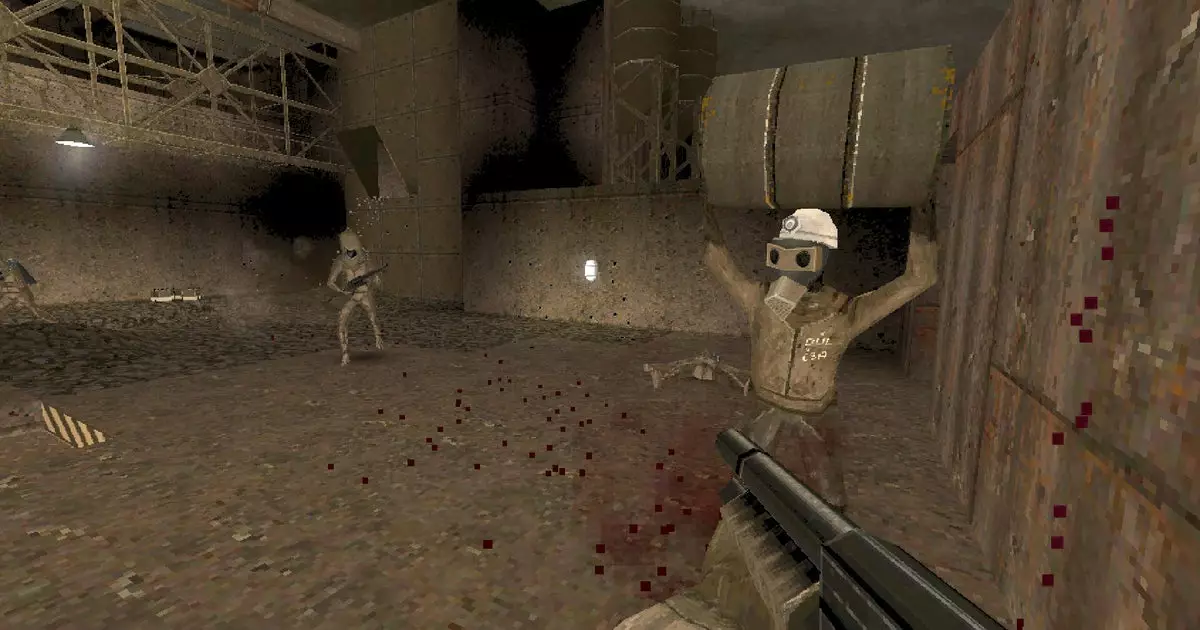Video games today are a complex tapestry woven from code, graphics, and the nuanced interactions of a player’s environment. However, every once in a while, a glitch sneaks into the fabric, creating an unexpected spectacle that can shift the entire gaming experience. Such was the case for the indie game “Hrot,” a title heralded for its homage to classic shooters like Quake. Over a year and a half post the game’s early access debut, developer Spytihněv has faced backlash from players, primarily for an unusual and incessant barking problem presented by in-game dogs. While player reviews generally fit a spectrum, the vocal minorities are often the loudest and most persistent.
Spytihněv candidly acknowledged that the issue was more severe than initially presumed. Though many players attributed the annoyance to personal preferences against seeing dogs bark amidst the chaos of gunfire, it soon became apparent that some configurations, particularly those running on Linux systems, were plagued by an infinite barking loop. What was meant to be a charming mechanic instead became an irritating hindrance, prompting the developer to issue a fix: a patch that would finally put an end to the looping canine chorus.
In the realm of video game sound design, auditory elements play a vital role in creating ambiance and engagement. In Hrot, the dogs—adorable companions meant to aid players in rat-hunting scenarios—unintentionally stole the spotlight with their unintended vocal onslaught. Spytihněv humorously hinted at the absurdity of the glitch, providing a commentary on the nature of bugs in game development. While the glitch itself was a nuisance, the developer’s thoughtful approach to addressing the community’s complaints highlighted a burgeoning trend in gaming development: transparency and responsiveness foster stronger relationships between creators and their audience.
While the barking dog’s saga represents a diverting chapter in Hrot’s story, it’s essential to recognize the broader canvas on which this game is painted. The game juxtaposes parody with terror. Players traverse through the vibrant yet haunting streets of a post-apocalyptic Prague, filled with culturally loaded symbols and dark humor. Critics, including Rick from our review team, noted that the game’s opening sets the tone brilliantly, weaving together elements of socialist allegory and nuclear dread.
The brilliance of Hrot is that it knows how to balance the serious and the absurd. One moment you’re encountering eerie reminders of history, and the next, you’re engaged in a frenetic battle against a gas-masked horse. It’s a wild ride that keeps players guessing, and even if they are temporarily pulled from immersion by an incessantly barking dog, the remarkable gameplay and engaging narrative elements usually draw them back in.
In the wake of Hrot, Spytihněv has not remained idle. Instead, the developer has shifted focus to creating a new strategy game called “Shrot,” which, fittingly, encompasses a completely different style: a retro real-time strategy game set in a surreal sandy expanse, blending whimsical imagery of horses, tractors, and techno beats. By transitioning into different genres, the developer showcases versatility and creative ambition.
This shift also poses an interesting conversation about how game developers manage their brand identity. While Hrot’s barking saga may have provided a rocky moment, for many, it was fleeting in light of their overall excitement for what the developer might deliver next. Engaging with the player base through updates, fixes, and humor amid adversity is not just about correcting mistakes—it’s about maintaining goodwill and fostering an evolving relationship with the audience.
Hrot’s dog-barking fiasco serves as a notable case study in game development. It’s a reminder that while high-tech game design matters, the nuances of sound and player experience significantly shape how a title is received. Novelty glitches can become talking points; following robust patching and community engagement, they can transform into amusing anecdotes rather than lingering frustrations. In the grand scheme of gaming, every glitch is a potential lesson. With every experience, both developers and players navigate the world’s intricacies, reflecting the unfathomable journey that video games embody.


Leave a Reply